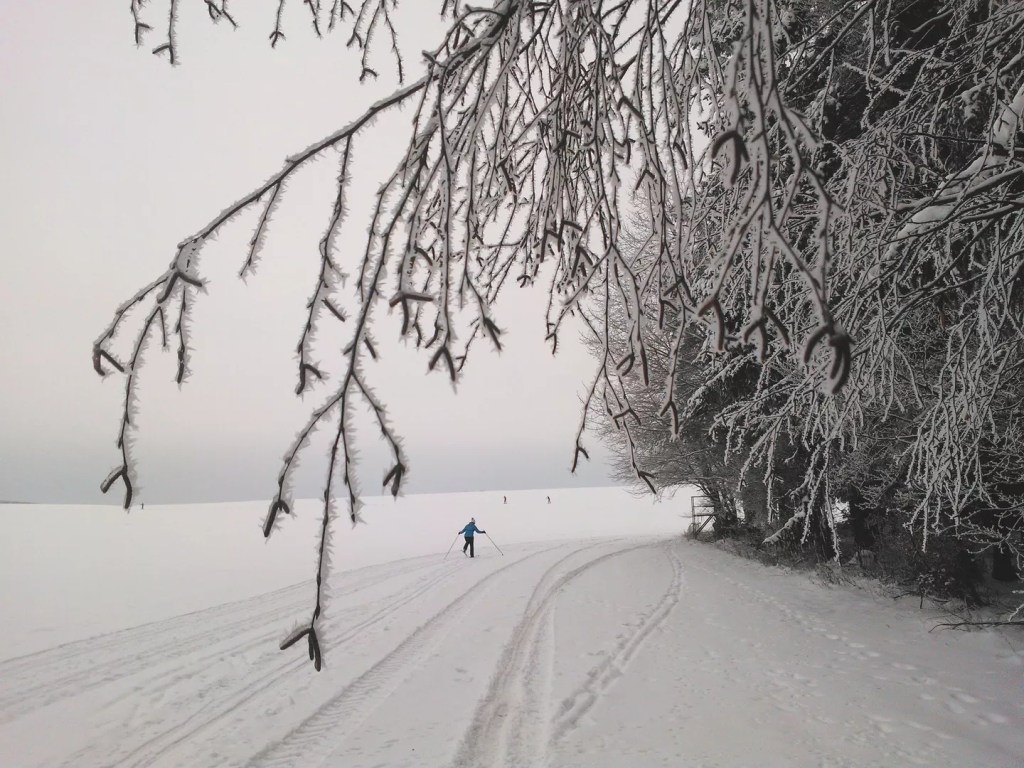We’re in the woods with composer, clarinetist, poet, philosopher, and author David Rothenberg, just a few minutes’ walk from his home in Beacon. After ambling up some muddy trails, Rothenberg, poet and spoken-word artist Iglin Deniz Akseloglu, visiting from her native Turkey, and I come upon a small pond, left unfrozen by an unusually warm late January. All is silent and still, the picture of Hudson Valley quietude. Or is it?
Rothenberg reaches into his backpack and pulls out a palm-sized, disc-shaped microphone attached to a coiled-up cord, plugs one end of the cord into a cylindrical wireless speaker, and casts the mic end into the pond like a yo-yo. It lands with a ker-plunk! and he powers up the speaker. “It’s winter and they’re all hibernating, so I’m not sure how much we’ll hear,” he says, adding, cryptically, “but we’ll hear something. We just might have to wait a little.”

We stand in silence for several minutes, listening in the crisp, cold air…And then, out of the speaker comes a faint burbling. And, after a few more minutes, another. And another. They’re followed by a series of soft, crunching sounds, perhaps from some twigs or vegetation being moved around by the ripples from an occasional gust of wind. An airplane drones above in the cloudless sky, a car whooshes by on a far-off road. The noises they leave behind, along with our own footsteps and voices, are echoed by the speaker’s signal, slurred and blurred after reverberating through the watery filter of the pond and mixing with the sparse sounds emitted by the dormant lifeforms beneath the surface—are they sleeping salamanders? Frogs? Insects? Turtles? Even Rothenberg isn’t sure, but it’s a hidden symphony, one that few realize is playing.
“In the spring and summer, when [the wildlife] is all awake and active, it’s really busy,” says the sound collector and artist, citing as evidence the vibrant examples that can be heard in Secret Sounds of Ponds, his new CD and a book. “On some days in the winter, you might sit for an hour before you hear something—but when you do, it’s very dramatic.” The book’s text and illustrations are dotted with QR codes that link to audio files of his pond recordings, some of which feature Akseloglu’s voice or the author playing along to the cryptic blips and squeaks on clarinet. It’s all very weird, wonderful, and, yes, musical.
The concept of jamming with nature isn’t one that Rothenberg himself created, but it’s one that he’s greatly furthered and been long involved with. “Hearing Paul Winter’s Common Ground [a 1978 album that blends recordings of wolf, whale, and eagle voices with soft jazz] when I was in high school was what first got me interested in the idea,” he explains. “That and [Canadian composer and environmentalist] R. Murray Schaefer’s 1977 book The Tuning of the World (the Soundscape), which I came across when I was starting to read a lot about music and learn about Ornette Coleman, John Cage, and other important people.” Rothenberg grew up in Westport, Connecticut, the child of an abstract painter/amateur singer-songwriter mother and an architect father. It was his dad who steered him toward the clarinet. “I knew I didn’t want to play cello, because that was what everyone else at school played,” Rothenberg recalls. “I wanted to play flute. But my dad, who really liked Benny Goodman, pointed out that if I played clarinet I could get more gigs playing classical and jazz.” At 14, though, Rothenberg was thrown out of the local youth music program. “The founder was this stiff, old, serious guy and I was just being an obnoxious teenager and laughing at him,” he remembers. “I also wanted to improvise, and he was very much against that.”
“Westport was a good place for music and nature,” says Rothenberg. “There was a river right outside our house and a reservoir and woods where I could hike and see crayfish and other animals. That was a big influence. And there was a great jazz record store in town called Sally’s Place, which was where I started buying a lot of albums on [seminal avant garde label] ECM. And [guitarist] John Scofield is from Wilton and the Brubeck family were close by.” Rothenberg attended Harvard and Boston University, earning a PhD in philosophy at the latter and at the former creating his own major that combined the study of music with that of communication. “The professors at Harvard were these cool, old hippies,” he says. “They’d have guest speakers like R. Buckminster Fuller.” After graduation he traveled and played jazz in Europe before moving to New York City to immerse himself in the scene there. While in Europe he’d been inspired by Norwegian philosopher and “deep ecology” pioneer Arne Naess to further embrace the idea of pairing culture with environmentalism, something that would lead to his founding of the quarterly publication Terra Nova: Nature and Culture and writing nearly a dozen books on nature and its inherent sounds.
And then there are his collaborations with those sounds. “Why Birds Sing was my first foray into this kind of thing, which began when I was invited to play along with the birds in the National Aviary in Pittsburgh,” says Rothenberg. “That’s when a white-crested laughing thrush really started responding to me, and I realized playing live with birds could be interesting.” Indeed it is, as the hypnotic 2005 album (released in conjunction with similarly titled book), which features several tuned-in guest players attests. “A few years later, I knew I should do something with whales, because I knew that humpbacks had amazing and emotional songs,” he says. The result was 2008’s Whale Music, recorded on the high seas with Rothenberg playing his clarinet into underwater speakers for the massive mammals to hear—and respond to with their own songs. The project generated both a companion book and a remix album with tracks by DJ Spooky, Scanner, Lukas Ligeti, and others.
On the human side, Rothenberg has performed and recorded with the likes of Peter Gabriel, Brian Eno, Suzanne Vega, Elliott Sharp, and the late, iconoclastic Kingston composer and accordionist Pauline Oliveros, whose theory of Deep Listening has been integral to his own perspectives. “When I was 18, I went to this residency at the Banff Centre in Canada run by the late Karl Berger of the Creative Music Studio where Pauline was teaching,” he says. “She had us do an all-night, drone-based performance. After that I didn’t see her for many decades, until I heard she had once done a cicada festival in Kingston. I said, ‘Let’s do another one,’ and we had a great show in which [Gabriel and King Crimson bassist and Kingston resident] Tony Levin also played.” The concert, which had the three playing along to the mating songs of the freshly emerged periodic insects, was recorded and released as 2013’s Festival of the Cicada. Using further enhanced digital recordings of the noisy insects, the Cicada Dream Band, comprised of Rothenberg, Oliveros, and overtone singer Timothy Hill, would create a self-titled CD in 2014; Bug Music, a 2014 album and book by Rothenberg, adds the sounds of crickets, katydids, water bugs, and leafhoppers to the mix.
Rothenberg met one of his longest-running collaborators, acclaimed area pianist Marilyn Crispell, in the 1980s, after he’d fallen asleep under a piano at Berger’s Creative Music Studio in Woodstock and was awakened by her playing. “David’s always been very connected to the natural world,” says Crispell, whose sublime 2010 duo album with the clarinetist, One Dark Night I Left My Silent House, was rated as one of that year’s best jazz releases. “What we do together is about sound, rather than compositions. As a musician, David’s very free and not tied down to anything. He’s a brilliant renaissance guy.”

Unsurprisingly, Rothenberg, who has been a professor of philosophy at New Jersey Institute of Technology since 1992, was drawn to the Hudson Valley by its lush nature. He and his wife, Estonian-born visual artist Jaanika Peerna, came to the region in 1995, settling first in Cold Spring and then in Beacon in 1998. Perhaps also unsurprisingly, their son is himself a prominent musical figure: the producer and DJ Umru.
Although his present focus is on the sonic riches of ponds, with the periodic cicadas set to appear this year, is Rothenberg planning to cut another record with the creatures? “Playing with a million cicadas really makes one a bit humble,” he muses. “You’re just one more little sound in the giant band. This year is the grand convergence of Brood XIII, the Northern Illinois Brood of 17-year cicadas with Brood XIX, the Great Southern Brood, spanning Illinois to Missouri and eastward. I plan to be out in the Midwest experiencing this. The climate is changing the world for all kinds of animals and plants. Sure looks like disaster is ahead, but so far there still remain so many interesting creatures with great sounds. We need to celebrate them, so we care more about them, enough to save them. The more music one hears in the world around us, the more we must work to value it and to save it. Beauty is not only in human attitude; it is a feature of the world around us. The Navajo knew that, Charles Darwin knew that, most of us know that, but we are quick to forget. We need to listen to the natural world, and to each other, as best as we can.”
On March 30 and 31, David Rothenberg will play two live concerts with ponds at an outdoor location to be determined (see website for locations and details). Secret Sounds of Ponds is out on CD and Soundcloud; the companion book is available from Roof Books. Linktr.ee/rothenbird
This article appears in March 2024.














